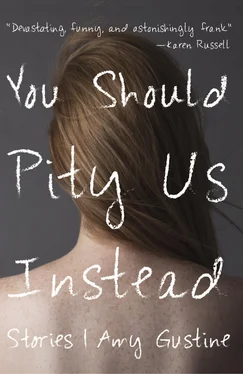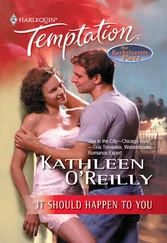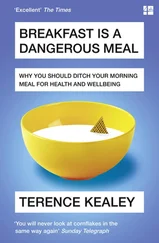The day after the baby is born, R’s mother announces she is going to resume her search. “I need the picture back.”
The boy is drawing it from his pocket when his mother shakes her head and holds out a hand to stop him. “You will get yourself killed,” she tells R’s mother. “And us. Go back to Israel. There is nothing you can do.”
“I just need my picture, and I will be gone.” R’s mother reaches for it, but the boy dashes from the house. He is a block away, running toward the beach, by the time she gets out the door. By the time her feet sink into sand, her breath is gone and a great pain has bloomed in her side. The boy is nowhere to be found.
Hours later he shows up with a falafel and offers her half.
R’s mother is rocking the baby from a stationary chair, moving her torso forward and back in a steady rhythm to keep them both calm. “Where is my picture?” she asks, without breaking stride.
Laughing, the boy makes a wave with his slender brown hand. “The water took it.”
For two weeks she wanders the streets, eavesdropping on conversations and occasionally describing R to a group of children. “Have any of you seen him?”
The boy’s mother begs her to stop.
“If it were him,” R’s mother points to the door to indicate the boy, gone out combing the rubble for metal scraps and helping his uncle fish, “if it were him, would you stop?”
When she is not searching, R’s mother holds the baby so the girl can sleep. The plan is to get her into Egypt, where the boy’s mother has distant family, but she can’t take the baby. “They won’t help her if they know.”
After the girl is gone, the boy’s mother will claim to have found the infant abandoned in a dumpster.
One day a friend of the boy’s is killed, backed over by a garbage truck during their foraging sessions at a nearby trash heap. After that, the boy stays home, stripping the insulation off copper wires with a rusty paring knife. His hands are crisscrossed with fine cuts where the knife slipped. He melts the lingering lamina over the gas stove, letting it drip onto a piece of cheap tin he’s sacrificed for the purpose, the different colored plastics rehardened into an intricate, overlapping pattern like veins and arteries.
R’s mother continues to go out, but increasingly finds her mind wandering when she should be examining faces, catching scraps of conversation. Everyone has begun to look familiar, harmless.
One afternoon she is in the market, standing half-concealed by a pillowcase hung to shade the orange vendor, a wizened old man who hums while rearranging his fruit. She’s bought a bag of garbanzos, fish, and mustard greens, and is bagging her oranges when twenty men walking in pairs split the crowd, their presence moving ahead of them in a conspicuous quieting and turning away. Hamas. They wear black shirts and pants, green headbands with white writing in Arabic and white cloths over their faces. Only their eyes, two dark nostril holes and the inside-out flesh of lips remain visible. Even R could be hiding among them and his mother wouldn’t know.
She dashes into the street and in a flash the men turn, point rifles, a few women let out screams, somewhere a box is knocked over and a hundred somethings click on the sidewalk. The oranges roll out of her bag and R’s mother collapses, frantically gathering the fruit. She feels the men assessing her, deciding she is no threat. They realign and march on. The vendor resumes his hum, placing the good fruit in back, the bruised up front. R’s mother looks up to see the last dark figure round the corner and pass out of sight.
Crying with humiliation and self-loathing, she doesn’t notice the two men in jeans follow her away from the market. She is nearly back to the boy’s house when the one wearing a blue oxford sneezes and she becomes aware of them. Something about the way they both look away when she turns alerts her, so she passes the boy’s house, keeping her eyes straight ahead, walks three more blocks, then doubles back to the market. There, she dodges and sidesteps, getting lost amid the other women’s thobes.
For hours she crisscrosses the city, looking for the blue shirt. By the time she feels it safe to go home, it is very late and she must make up a story about getting lost.
In the morning she takes the boy aside and tells him about the men. “Be careful.”
The boy tells her not to worry, though of course she does. When he gets home hours later, she realizes she’s been preparing all day to surrender in exchange for his long nose, his too-big teeth. The puff of hair on the back of his head that bounces when he runs.
“Did you see them?”
The boy nods at the curtain, behind which his mother mutters instructions to the girl about how to keep the baby awake until her second breast is empty.
“They’re her brothers,” he whispers.
•
R’s mother has a little money left. She offers it to them. “The girl must go. I’ll take her.” R’s mother will pretend to be an aunt.
The boy manages to get an Egyptian passport for a twenty-year-old male, so they weave a tale of marriage across borders to tell Egyptian customs officials, and cut the girl’s hair short, find her a pair of brown pants and a dark shirt, boys’ sandals.
But her hands are a problem. “Too smooth,” the boy points out. “And too clean.” He shows her how to dig through the bag of scrap metal. “Like you were looking for treasure.”
When she is done, her nails, formerly half moons pumped red and shiny with a nursing mother’s swollen veins, are torn, and her knuckles abraded. The boy rubs dirt from the floor on them. “Perfect.”
The plan is to dress her as a girl leaving Gaza so she is less likely to be searched and found lactating, and where passports mean nothing anyway. In Egypt, where the passport becomes important, she will become a young man.
The morning they are supposed to leave, the boy goes out early to fish. Before he leaves, he sheepishly offers R’s mother a wad of shekels, the money she gave him that first day to buy information. “You will need it to get out.”
She takes a few bills, tallying how much it cost to get in, then presses the remainder on him.
R’s mother and the girl are to meet a man who will take them in a taxi to Rafah, from which someone else will get them to a tunnel. R’s mother keeps imagining the men between here and home to be the Christian pig farmer, his shiny pate and kind eyes, his gentle hands on her hips.
The girl insists on walking separately in case there is trouble. “You can get away.”
R’s mother agrees to go first, hoping she can recognize the brothers and distract them if need be.
A blue car with a white stripe is waiting for her as she reaches the corner. The man gives her the word— tilapia —they had agreed on, and she gets in, holding a finger up for him to wait. As the girl reaches them, a shifting lump under her thobe gives the baby away. R’s mother pauses, then nearly shouts, her throat pulling closed, “Let’s go. We’re ready.”
They drive out of the streets, anonymous in the early morning dark. As they reach the edge of town, the ululating voice swells and the taxi stops. The driver gets out first, then the girl. R’s mother slides across the seat and stations herself between them. Clumsily, she mimics their movements, rising and kneeling, rising and kneeling.
As she gets back into the car, still shielding the girl from the driver’s view, she glances down the street. Between two buildings the Mediterranean glimmers under an oblique sun. Dark heads dot the pale sand, their motion like birds alighting, then startling, then alighting again. She hopes her boy is among them, praying.
Читать дальше












